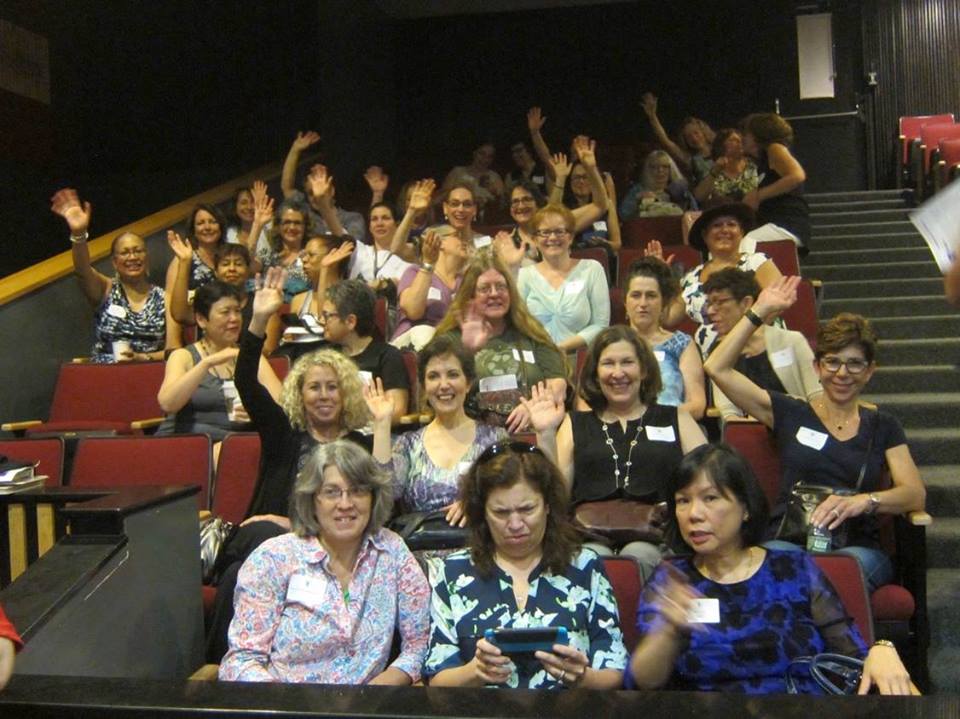All-Girl NYC Class Joins Women's Marches 40 Years After Graduating

Some 200,000 people are expected to attend the Women's March on Washington Saturday to rally for women's rights. A million more will attend sister marches across the nation and around the world. The rallies come the day after the inauguration of Donald Trump, whose campaign and new administration have left many women concerned over the future of women's healthcare and other women's rights issues.
Adding their voices to the rallies in D.C. and elsewhere is the 1976, all-girl class from the elite New York City public school Hunter College High School. Before going co-ed, Hunter was the only elite public school in the city for girls. Many of the women from the class of '76 reconnected at their 40-year reunion and through an active Facebook group for their class.
"It's just a wonderful group to connect with, I don't even know how to put it into words," said Grace Lee Cothalis, a member of the class who now lives in Vermont. "It's just so special."
It was in the Facebook group Cothalis found a way to be part of the March on D.C. She can't make it down in person, but she decided to become part of a project to knit so-called "pink pussy hats" for marchers. The cat-shaped hats are meant to be a play on derogatory comments Trump made about women in a 2005 recording.
"And I, you know, I like to make stuff. So I was like, 'Oh, this is perfect.'," Cothalis said. "So I made one and I posted it and I said, 'Hey, anyone in the group going to DC? I'll make you one.'"
Cothalis wanted to make the hats specifically for the women of her high school class, many of whom shared their plans for the Women's March in their group. She shipped the first hat she made to Puerto Rico, where her classmate Juli Silver Taracido lives. Armed with her pink hat, Taracido is making the trek from the Caribbean Island to Washington D.C. to participate in the march. She will meet her mother and another Hunter classmate in New York City before they all drive to the capital.
"I'm fearful for civil rights issues that may be taken back, for women's rights issues that will be turned around," Taracido said. "[Trump] represents, to me, the most despicable elements of our society."
Taracido said she feels heartened to see friends across the United States participating in marches. But she said from her Hunter classmates, she would expect nothing less.
"We were, as young women, and thankfully continue to be, people that are not easily swayed and that are critical thinkers and that are socially committed," Taracido said.
Laurie Friedman is another such socially committed Hunter woman. She now lives and works in Massachusetts as a midwife. Friedman will join with other midwives to march in Boston. And rather than carrying signs, they will be carrying giant, hand-made puppets to draw attention to women's health issues.
"One of the puppets is a pregnant woman. I'm calling her the pregnant goddess because she's teal blue and has multi-colored hair," Friedman said. "And then I have two midwives, a young midwife and an old midwife."
Friedman said a large reason she became a midwife was because of the feminist movement going on while she was in high school and college. Women's health became something she cared deeply about. And her experience at an all-girl high school played a part as well.
"The kind of bullying for being a smart girl I experienced in elementary school, it was really lovely to have that go away and be surrounded by other people who were a lot smarter than I was and to have that be valued in the way it was at Hunter," Friedman said.
This belief is one shared by Cothalis.
"There was never any thought of, oh, you weren't capable of something. Or any pressure to feel like, oh, you need to kind of adjust your personality or dumb yourself down," Cothalis said. "That kind of supportive environment of, 'You can do anything and you're really brilliant,' I think that's kind of priceless."
The belief is also shared by Taracido.
"It felt very comfortable," Taracido said. "It did influence me in terms of feeling more self-assured by the time I graduated, feeling very comfortable in my skin, feeling that as a woman, I was not inferior."
This shared experience has helped keep the class bonded 40 years later online.
"People are basically very caring and nice to each other," Friedman said. "I mean, it's not -- people don't respond to each other's posts in a negative way. You can pretty much count on whatever you post, somebody has something supportive, or a common experience, or an agreement with what you're wanting to share."
Now, this class of like-minded women are using that connection to help each other continue to stand up for women's rights. Along with Cothalis, Taracido and Friedman, Hunter class of '76 will be represented at marches in Washington D.C., New York, Seattle, Portland, Oakland and even London.

